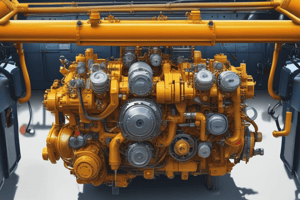Podcast
Questions and Answers
What type of engine is commonly found in cars due to their compact size, low cost, and widespread availability of fuel infrastructure?
What type of engine is commonly found in cars due to their compact size, low cost, and widespread availability of fuel infrastructure?
- Gasoline engines (correct)
- Electric engines
- Diesel engines
- Hybrid engines
Which type of engine uses rechargeable batteries as its power source?
Which type of engine uses rechargeable batteries as its power source?
- Gasoline engines
- Diesel engines
- Electric engines (correct)
- Hybrid engines
Which engine type combines both electric and traditional internal combustion engines for higher mileage?
Which engine type combines both electric and traditional internal combustion engines for higher mileage?
- Gasoline engines
- Diesel engines
- Electric engines
- Hybrid engines (correct)
Which engine type was once considered more efficient than gasoline engines due to better economy per gallon of fuel?
Which engine type was once considered more efficient than gasoline engines due to better economy per gallon of fuel?
What technology has helped bridge the gap in efficiency between gasoline and diesel engines?
What technology has helped bridge the gap in efficiency between gasoline and diesel engines?
What do hydrogen fuel cell vehicles emit from their tailpipes?
What do hydrogen fuel cell vehicles emit from their tailpipes?
Which safety feature alerts drivers to potential blind spot hazards?
Which safety feature alerts drivers to potential blind spot hazards?
What is the main function of seatbelts in a vehicle?
What is the main function of seatbelts in a vehicle?
Which safety feature helps drivers see what's behind them when maneuvering?
Which safety feature helps drivers see what's behind them when maneuvering?
What does Adaptive Cruise Control (ACC) help maintain relative to the vehicle ahead?
What does Adaptive Cruise Control (ACC) help maintain relative to the vehicle ahead?
Flashcards are hidden until you start studying
Study Notes
Types of Engines
Cars come with various types of engines, each offering different performance and efficiency characteristics. Some common engine types include gasoline engines, diesel engines, hybrid engines, electric engines, and hydrogen fuel cell engines. Here's a brief overview of each.
Gasoline Engines
Gasoline engines run on petrol and are commonly found in cars due to their compact size, relatively low cost, and widespread availability of fuel infrastructure around the world. They have been used extensively in cars since the early days of automobile development.
Diesel Engines
Diesel engines were once considered more efficient than gasoline engines, producing better economy per gallon of fuel, because they burn fuel more completely, creating less waste in the exhaust. However, the rise of direct injection technology has equalized this gap between gasoline and diesel engines.
Hybrid Engines
Hybrid vehicles combine both electric and traditional internal combustion engines. This allows them to achieve much higher mileage due to regenerative braking and energy recovery systems. By using the electric motor for accelerating and the internal combustion engine only when necessary, like highway cruising, hybrids typically offer superior fuel economy compared to conventional vehicles.
Electric Engines
All-electric vehicles are powered by rechargeable batteries, which means they produce zero tailpipe emissions. They can also save money over time if charged from renewable sources. These cars are particularly popular in California due to its strict vehicle emission standards.
Hydrogen Fuel Cell Engines
Hydrogen fuel cells work similarly to rechargeable battery-powered cars, converting chemical energy into electricity. Unlike gasoline or diesel vehicles, hydrogen fuel cell vehicles emit only water vapor from their tailpipes – eliminating all tailpipe pollutants except for nitrogen oxides, which are subject to regulation.
Car Safety Features
Car safety is paramount for ensuring passengers remain safe during operation. Modern cars are equipped with numerous advanced safety features designed to reduce accidents and prevent injuries. Here are some key safety technologies currently available:
-
Airbags: A crucial element of any crash protection system, airbags deploy in the event of a collision, absorbing impact forces in order to protect occupants from serious injury or death.
-
Seatbelts: Required by law in many countries, seat belts keep you in your seat and help distribute the force of a crash across your body rather than concentrating it on a single point, reducing the risk of injury.
-
Automatic Emergency Braking Systems (AEBS): This feature automatically applies the brakes to avoid or mitigate collisions with other vehicles, pedestrians, or stationary objects.
-
Blind Spot Monitoring System (BSM): BSM alerts drivers to potential blind spot hazards, helping to reduce the risk of side collisions.
-
Lane Departure Warning System (LDWS): LDWS uses cameras and sensors to detect lane markings and alert the driver when the vehicle begins unintentionally deviating from its lane without signaling.
-
Adaptive Cruise Control (ACC): ACC maintains a consistent speed and distance relative to the vehicle ahead, allowing automatic deceleration and acceleration back up to a pre-set speed after stopping.
-
Rearview Camera: Reverse camera systems help drivers see what's behind them and improve visibility while maneuvering in tight spaces.
These are just a few examples; modern cars come with an array of additional safety features designed to enhance road safety.
Studying That Suits You
Use AI to generate personalized quizzes and flashcards to suit your learning preferences.



